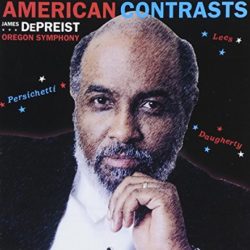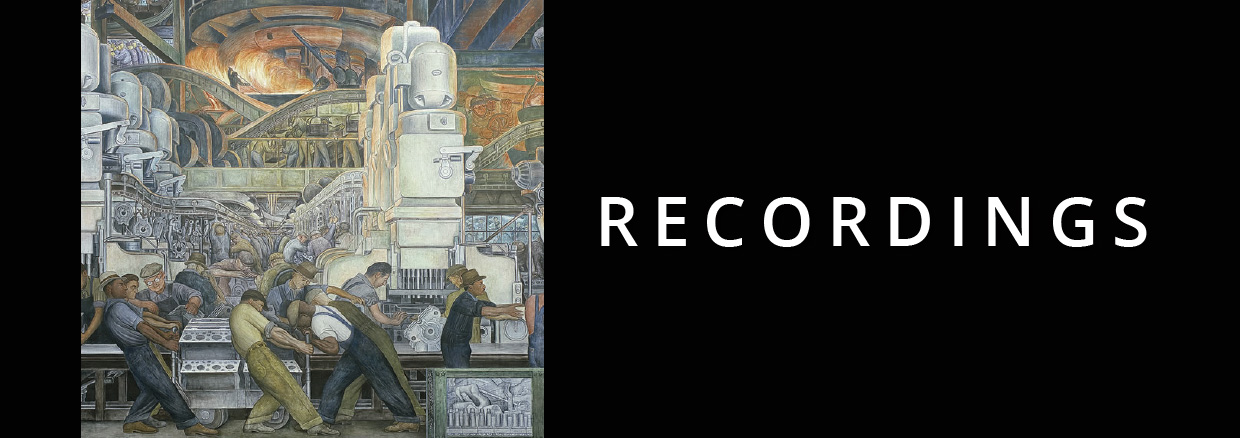American Contrasts
Delos Records/May 2003
Sundown on South Street from Philadelphia Stories/Hell’s Angels
Bassoon Brothers
Oregon Symphony Orchestra
James DePreist, conductor

REVIEW FROM FANFARE MAGAZINE, FEBRUARY 2004:
Benjamin Lees’s catalog contains a number of short and punchy orchestral pieces—Profile, Spectrum, Concertante breve, Mobiles, and Borealis among others—which should be especially useful for opening or filling out concert programs. Surprisingly enough, this premiere release of his Passacaglia for Orchestra of 1976 is the first such work of his ever to be recorded, and it is without doubt one of the best. Utilizing the format of theme, 19 variations, and a coda, this 12-minute showpiece exploits orchestral resources in the composer’s typically wiry and muscular fashion. Because an infusion of aggressive tension linked to a laconic economy of means have been constants in Lees’s music from his earliest scores of the 1950s, this Passacaglia not only moves along at a very unpedantic clip, but also generates a tremendous charge of pent-up energy. DePreist gives a solid and sensible account of the score’s gradually intensifying torque, but he seems to be holding back a bit on the degree of acceleration this listener hears in an aircheck by the Detroit Symphony under Werner Torkanowsky (a much underrated conductor and composer, by the way).
The dynamic Persichetti Fourth Symphony is one of his more genial and even laid-back essays in the form, with its attractive blend of Yankee assertiveness and urbane neo-Classicism. Its second movement opens with an especially beguiling and amiable theme, a kind of hesitant pavanne, that the composer works up into a variety of delectable shapes and meters. Although not as dramatically expressive as some of the later symphonies, such as the ferocious Fifth for string orchestra or the massive Seventh (which remains inexplicably unrecorded to this day), every measure of the Fourth testifies to Persichetti’s civilized intelligence and intuitive sense of proportion in shaping phrases, movements, and whole structures. Since the original analog Columbia recording of the Fourth by Ormandy and the Philadelphia Orchestra has been reissued by Albany, DePreist would have served us better by recording its immediate predecessor, the Third (also premiered by Ormandy and even mentioned in this annotation), the work that first established its composer’s reputation as a symphonist. Nevertheless, DePreist again offers a more than serviceable reading, though, good as the Oregon Symphony is, it obviously cannot yet measure up to the Philadelphia in its glory days.
This nicely varied program closes with two samples of the work of Michael Daughterty (b. 1954), who is fast becoming one of the most conspicuous and prolific proponents of the new pop-classical “crossover” school. The evocative third movement from his Philadelphia Stories (a not-so-veiled reference to the Tom Hanks AIDS film?)—”Sundown on South Street”—exemplifies Daugherty’s unerring instinct for synthesizing the full panoply of American pre-rock pop idioms from Percy Faith to Stan Kenton. But his concerto for bassoon quartet and orchestra—Hell’s Angels—with its sounds of thundersheet, metal chains, and bass drum, together with the demented yells of the orchestra personnel (in obvious tribute to the notorious motorcycle gang), is a glaring example of where the self-conscious pursuit of the outrageous and a determined exploitation of “bad taste” becomes simply self-defeatingly cute through overextension and overexertion. But DePreist certainly manages to convey a most positive account of this clever and brilliantly trashy stuff. And it’s good to see Delos once again bringing out some interesting repertoire, highlighted by their customary precise and spacious sonics.
All in all, an unusual program whose raison d’être and d’avoir remains Lees’s powerhouse Passacaglia.
– Paul A. Snook
